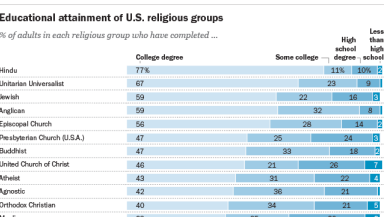Pew Research Center has released a survey of the most and least educated US religious groups. It makes interesting reading, but it probably doesn't tell us as much as some would like it to.
By far the most educated are Hindus, with 77 per cent having a college degree. Unitarian Universalists are at 67 per cent, with Jews and Anglicans on 59 ('Episcopal Church' is on 56 – an odd category as it's the US version of Anglican).
What's noticeable is how far down the list the evangelical denominations come. The National Baptist Convention is on 19 per cent, and so is the Southern Baptist Convention, at around 16 million members the largest Protestant denomination in the country. It's not a straight-line correlation, though; the mainline American Baptist denomination has only 12 per cent with a college degree, with 17 per cent – nearly the highest in the survey – not having finished high school.
The survey makes the point that "Since Catholics make up one-in-five adults, it is not surprising that their share of members with a college degree (26 per cent) roughly mirrors that of the general public."
The same dynamic is at work in other large denominations – the more members you have, the more your educational level will tend to flatten out toward the norm. Similarly, the fewer members you have the more likely it is that particular factors can skew your figures one way or the other. And if a denomination or religious group – particularly a small one – works mainly in deprived areas where not many people finish college, it will show a lower educational achievement; if it is mainly made up of aspirational professional types, it will be higher. So if the Southern Baptists, for instance, seem to be demonstrating a lower educational level, it might be that it's because they're working in communities where not many people go to college.

And of course the same applies to atheists, who also figure. Four in ten atheists (43 per cent) and agnostics (42 per cent) have college degrees, but they are only 3.1 and four per cent of the US population.
This close to the US election, it's impossible to write about figures like this without wondering how they play into support for Donald Trump. An Atlantic analysis showed that while "more than 60 percent of Trump's coalition is white and doesn't have a college degree", these non-college graduates were disproportionately likely to be women over 45 who were financially secure – a full quarter of his voting base. And it's fair to say this group would be heavily represented in many evangelical churches.
However, more broadly, these figures ought to warn us against reading too much into statistics about college education. Education, or so the theory goes, ought to give someone the ability to think critically about issues and protect them from being deluded by demagogues who prey on their lack of intellectual sophistication. In fact, education is just one factor in political loyalties and decision-making. It is no guarantee that someone will choose to think rationally, even if they're capable of it; and neither is lack of formal education any indication that someone isn't highly intelligent and informed.
Furthermore, this ought to be remembered when another survey comes out purporting to "prove" that atheists are more intelligent than Christians because more of them have college degrees – there are simply too many variables to make this a valid comparison.
Follow Mark Woods on Twitter @RevMarkWoods.













